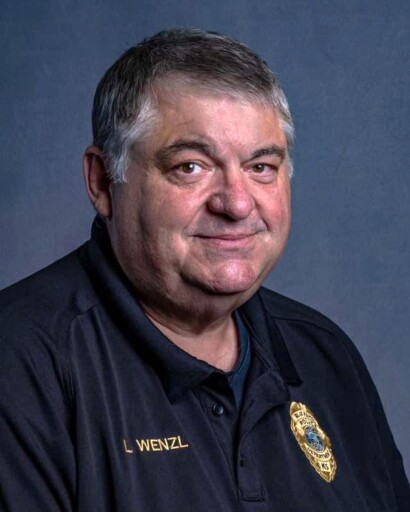

Larry Wenzl
August 12, 1961 — September 20, 2024
Larry Wenzl
Larry Wenzl, who saved lives, outwitted and arrested criminals and protected vulnerable people for decades in Washington and Marshall Counties, died on Sept. 20, 2024. It was a day with sunshine and pleasant breezes. He would have gladly chosen the date himself, as it’s the end day of summer and the season when the fall harvests of friends like Chris Hansen crank up in earnest.
Larry Keith Wenzl was born at the Washington County Hospital on Aug. 12, 1961, the third son of a Logan Township farm couple, Gene and Rosie Wenzl. He was so eager for daylight that he entered the world on the hospital gurney before nurses could roll his mom into the birthing room.
Theirs was a tight-knit family of compulsive storytellers, a dynamic that led Larry and his brothers to later take up adventurous jobs, professions or side gigs to run toward trouble and help the sick, the poor and the vulnerable. Larry grew up working farm dirt and livestock alongside his four brothers, his father Gene, his uncle Matt Uhlik and his grandfather Emmet. His father put him in a tractor seat at age eight. He showed high aptitude for mechanics, fence fixing and for other complex farm work, though his frustrated father later said (wrongly) that “all that boy cares about are roaring engines and black smoke curling off spinning tires.”
He graduated from Washington High School in May 1979, and began training to become a Washington County emergency medical technician that same month, along with his brother Gary. Soon after this, he started tech school in Salina and learned body shop work. There, in Salina, he met Sandra Dee Paxson, who was training as a nurse at the Asbury Hospital School of Nursing in Salina.
Despite his late father’s misgivings, Larry began to take over the family farm shortly after his father died in 1981 – the same year Larry married Sandy (June 27). The farm was barely making it, but the young couple revived it while working in partnership with farm neighbor Chris Hansen, a close friend. They undertook a demanding workload for decades: Full-time jobs, full-time and heavily involved parenthood and many hours spent every week managing the farm.
He saved lives first during years of working as an emergency medical technician, and then later as a police officer, starting in 1999.
His life work is also Sandy’s. They are well-known, having preserved lives or delivered babies as she did. She has worked as a nurse in Marysville for decades; both preserved lives as EMTs. Though Sandy was the primary caregiver, they together undertook the grueling work, on call 24/7 for nearly a decade, while caring for Larry’s mother Rosie Klozenbucher, who died last year. Larry and Sandy also made several younger people feel like they had a second set of wise and resourceful parents; the names of those younger persons, as Larry might say, “are nobody’s business; but you know who you are.”
His great love was for Sandy and family, but with a frustrating caveat: Though he was borderline worshipful of Sandy all 43 years of their marriage, he also defied her. After several health scares, she and his children demanded that he see how stress and obsessive work endangered his health. She wanted him to retire from the alternative and sometimes sulfurous universe of 911 calls. But when he did retire from the Marysville Police Department in 2018, he soon went back to police work full time.
His end came, more or less, the way he’d always wanted. He was wearing his dark blue uniform, carrying his weapon and badge on duty as a Blue Rapids city police officer, when a stroke knocked him down on Jan. 22.
Paralyzed on his left side, he fought to recover in rehab. He got well enough that the family has a video of him using a racquet to tap a balloon back and forth with grandson Terry. He cracked jokes. One day, when staff at a rehab center offered his brother Roy a free noon meal, Larry said no. “If you keep doing that, he’ll just keep coming back.” But Larry declined, and in late July, he decided, with Sandy, to enroll him in hospice care. He told niece Rose Roths not long after: “I’m at peace with this.”
He seldom lived at peace in his 63 years. With son Don, Larry worked the Wenzl farm while working sometimes multiple law enforcement jobs, including double shifts. The farm sometimes meant long labor, especially at calving time.
His police service included car chases, wife beaters and other brutal criminals, frustrating records searches, drunk drivers and bug-infested surveillance on drug dealers making meth in houses that included children. There was complicated detective work and a couple of officer-involved shootings, though he never had to fire his weapon. There were hand-to-hand encounters, which his opponents regretted: Larry stood at six feet four and north of 250 pounds, most of it made up of muscle, bone and good eye-hand coordination.
One night in 2006 he was working part-time for the Blue Rapids police department, when he and other officers gave chase to a man determined to kill his estranged wife; two officers were Larry’s close friends, Marshall County sheriff’s deputy Tim Ackerman and Blue Rapids chief, Ryan Woodyard. They chased the man into an alfalfa field. Ackerman got out, saw a rifle in the man’s lap and grabbed his leather jacket through the open truck window, but the man sped off. Minutes later the officers blocked the man in another field, Ackerman in one patrol truck and Larry with Woodyard in the other. Larry had not yet pulled his weapon as he got out; the man got out and aimed a rifle at Larry from yards away. “But I dropped the guy,” Ackerman said. “Pop-pop.”
Larry said Ackerman yelled with some anguish: “Why did you make me do that!” The gunman was dead; Ackerman was later awarded a top state law enforcement award for saving Larry’s life. But Ackerman, now the Marshall County Sheriff, said: “I never took the award out of its case. I had nightmares for a few years.” And so did Larry.
Stories about his younger days were great for telling around son Don’s fire pit at the farm; but Larry came to abhor law-stretching behaviors that he’d done as a kid. He knew as a man what a toll that bad judgment took on families. More than once, as an EMT or officer, it was Larry who was assigned to knock on a door in the wee hours to deliver bad news.
But in fairness to truth, Larry apprenticed for his law enforcement career by working relentlessly as an underage law-stretcher: He was a local legend. He drove 100 mph-plus while underage and drinking with friends, though driving and drinking did not always occur concurrently. “Leapfrog” involved six or seven cars driven at 110 mph by Larry and friends; the winner, usually Larry, was he who reached some agreed-upon town’s city limits first.
At Don’s fire pit, other stories were told: At age 14 Larry and friends tried to escape one night from Washington County Sheriff Charlie Hern. The boys raced down dust-choked roads, then through Wenzl cow pastures. They rolled inside the farm machine shop, while Larry’s dad watched from the front steps -- Larry shut the doors to hide them only moments before Hern drove past and missed them.
“I don’t suppose you’d like to tell me what that was all about?” Larry’s father asked. “Nope.” Sheriff Hern later became a friend and mentor.
But something else was stirring: One night, when Larry was 13, he and Ray Weichman, a farmer neighbor, tried to rescue three injured people, including a small girl, whose car had rolled into a ditch. There’s no need to go into the details here, but he said often that the trauma of that encounter prompted him not many years later to choose professions where he could rescue people.
He was unusually popular among people in two counties. Stories abound about his befriending of children, elderly people in need of company and straying dogs in need of a return home to their distraught owners. His daughter Atarah remembers that even men her father had arrested multiple times would tell her years later: “Your father is a good man, always treated me with dignity and respect.”
And one day decades ago, his brother Roy borrowed Larry’s car and drove into Washington to run errands. People – lots of people -- honked and waved enthusiastically, thinking it was Larry they saw at the wheel. “Nobody ever waved or honked at me in that town,” Roy told Larry later. “It was like one of the Beatles had turned up.”
On the day before Larry died at the Linn Community Nursing Home, Blue Rapids police chief Ryan Woodyard, who had seen that 2006 shooting up close, stood vigil for hours at his bedside with Larry’s family. When Ryan had to leave, he placed Larry’s #23 police badge on Larry’s chest. “Nobody will ever wear #23 again,” Ryan said.
Larry died the next morning with his son Gene by his side; Gene is a nurse at the nursing home; he spent months calmly navigating his father, mother and his extended family through the long ending.
Larry’s interests included family history, American history, gun collecting and collecting and restoring classic cars. It was with great pride that he restored his father Gene’s 1930 Model A Ford just last year; he had worked on it, including with his father, since the 1970s. The car will play a role in his funeral services.
The funeral gathering will be at 10 a.m. Saturday Oct. 5 at the Blue Rapids school gymnasium at 509 Chestnut Street in Blue Rapids. His many car-collecting friends are requested to please come in their classic cars, though other cars are welcome, if not quite as interesting. Anyone listening to a police scanner on that day, Woodyard said, will hear Marshall County dispatchers call out: “Marshall to #23. Marshall to #23.” Then a few appropriate words. Then an announcement that this is the last call for #23. That he has come to end of watch.
There will be a graveside service the next day for family only, in a Wenzl cow pasture in which Larry’s remains will be lowered into the Kansas sod inside one of his many superfluous but cherished and absolutely necessary don’t-you-dare-try-to-toss-that tool box. Larry would prefer to say he’ll get planted rather than buried (planting implies new growth), so we will say that the man and his box will get planted facing east. He’ll see sunrises while resting next to his natural marker -- a large and pretty pink Dakota Quartzite glacial erratic boulder that Larry always admired. And likely still does.
#23 End of watch, brother.
His parents and older brother Gary preceded him in death. Besides his beloved and best friend Sandy, he leaves their three children, Gene (and Kelly) from Clay Center; Don (and Kaitie) from the farm near Greenleaf; and daughter Atarah Sauter (and Eric), Omaha, Neb. He leaves four grandchildren: Katherine, Brynne, Terry and Marielle. He leaves three surviving brothers: Roy (and Polly), Wichita; Tom (and Carol) Canon City, Colo; and Rich (and Judy), Almena, Ks. (Rich and Larry were both battle-tested cops, and the stories they told around that fire pit cannot be replicated or equaled). Larry leaves two sisters-in-law, Sheryl Wenzl (Wichita) and Missy Wenzl McClain, Wichita. He leaves Tom Wenzl (and Joanie) of Seattle, who is a distant cousin and fellow cop-and-classic-car guy who became Larry’s brother-from-another-mother.
Past Services
Memorial Service
Saturday, October 5, 2024
Starts at 10:00 am (Central time)
Blue Rapids Gymnasium
Guestbook
Visits: 4575
This site is protected by reCAPTCHA and the
Google Privacy Policy and Terms of Service apply.
Service map data © OpenStreetMap contributors






